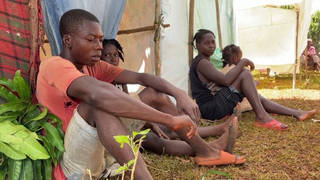
By Amy Goodman with Denis Moynihan
Jean Montrevil was shackled, imprisoned, about to be sent to Haiti. It was Jan. 6, days before the earthquake that would devastate Haiti, the poorest nation in the Western Hemisphere. Montrevil came to the U.S. with a green card in 1986 at the age of 17. Twenty years ago, still a teenager, he was convicted of possession of cocaine and sent to prison for 11 years. Upon release, he married a U.S. citizen; he has four U.S.-citizen children, owns a business, pays taxes and is a legal, permanent resident. He is a well-respected Haitian New York community activist. But because of his earlier conviction, he was on an immigration supervision program, requiring him to check in with an immigration official every two weeks. On Dec. 30, during his routine visit, he was immediately detained and told he would be deported to Haiti. A fellow detainee bound for Haiti had a fever. That man’s illness halted the flight, and then the earthquake struck.
The devastating toll of the Jan. 12 earthquake in Haiti continues to mount. Most efforts to rescue people from the rubble have ended. More than 150,000 people have been buried, some in makeshift graves near the ruins of the homes where they died, but many in unmarked, mass graves at Titanyen, the site of massacres during previous dictatorships and coups. More than 1 million people are homeless out of Haiti’s population of 9 million. The stench of decaying bodies is still pervasive in the capital city of Port-au-Prince as well as in outlying towns, which, two weeks out, have seen little outside help. It was painful to see the mass of aid stockpiled at the airport. The Haitians need it now. For example, I saw pallets with thousands of bottles of Aquafina water there. Hopeful when a truck arrived to load up, I asked where it was headed. “To the U.S. Embassy,” I was told.
One of the principal sources of national income in Haiti is the flow of remittances from the Haitian diaspora, whose cash, wired to family members back in Haiti, amounts to one-third of Haiti’s gross national product. For years, after four major hurricanes and massive flooding, the Haitian community has simply been asking to be treated like Nicaraguans, Hondurans and Salvadorans in similar circumstances, to receive Temporary Protected Status (TPS). TPS allows people to stay in the U.S., and legally work, during times of armed conflict or natural disaster, and is a critical element of any humane policy. Finally, following frantic grass-roots lobbying after the earthquake, the U.S. government extended TPS to Haitians.
But TPS is not enough. Haitians need to be allowed into the United States, legally, compassionately and immediately. I visited hospitals and clinics in Port-au-Prince, with thousands of people waiting for care, and amputations happening with ibuprofen or Motrin, if patients were lucky. Ira Kurzban, a Miami-based attorney who represented Haiti for years, says the U.S. must let in those immediately who need medical care, that far too few of the injured have been brought to the U.S. In addition, he told me, the U.S. should bring many more people from Haiti, including all those people who had approved petitions by family members. It’s about 70,000 people. These people have been approved, but are essentially in a multiyear waiting line to move to the U.S. Kurzban compared the historical willingness and ability of the U.S. to accept Cuban refugees with what he calls a policy of “containment” with Haiti, preventing people from leaving and blocking the shores with the Coast Guard. The first thing I saw when flying in to Port-au-Prince days after the earthquake were the Coast Guard cutters. They weren’t bringing aid in, or carrying people out. They were preventing Haitians from leaving.
National Nurses United, the largest nurses union in the U.S., has 12,000 registered nurses willing to travel to Haiti to help, but they say they can’t get assistance from the Obama administration. So they called filmmaker Michael Moore. He told me this week: “This is pretty pathetic if you’re having to call me. I mean, you are the largest nurses union … and you can’t get a call in to the White House?” The NNU is seeking individual sponsors through its Web site.
Grass-roots and church groups in New York City demanded freedom for Jean Montrevil, and he was released. It is that kind of solidarity that is now needed by millions of Haitians, here and in Haiti, suffering the greatest catastrophe in their history.
Amy Goodman is the host of “Democracy Now!,” an independent, daily global TV/radio news hour airing on more than 950 stations in the United States and around the world. She is the author of “Breaking the Sound Barrier,” recently released in paperback and now a New York Times best-seller.
© 2011 Amy Goodman











